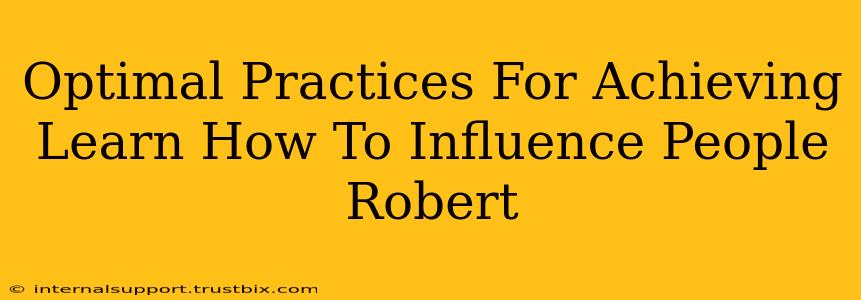Want to master the art of persuasion and learn how to influence people effectively, drawing from Robert Cialdini's renowned work, "Influence: The Psychology of Persuasion"? This guide dives into practical strategies to implement his principles and achieve your goals ethically and effectively. We'll explore how to leverage these techniques in various aspects of life, from business negotiations to personal relationships.
Understanding Cialdini's Six Principles of Influence
Before we delve into practical applications, let's refresh our understanding of Cialdini's core principles:
- Reciprocity: The powerful human tendency to repay what we receive. Giving something first often increases the likelihood of getting something in return.
- Commitment and Consistency: People strive to be consistent with their existing commitments. Once someone makes a commitment, they are more likely to follow through.
- Social Proof: People tend to follow the actions of others, especially in uncertain situations. This highlights the power of testimonials and social validation.
- Authority: People are more likely to be influenced by those perceived as credible experts or authorities in a given field. This emphasizes the importance of showcasing expertise.
- Liking: We are more likely to be influenced by people we like and trust. Building rapport is crucial for effective persuasion.
- Scarcity: The perception that something is rare or limited increases its perceived value and desirability. Creating a sense of urgency often drives action.
Practical Applications & Optimal Practices
Now let's explore how to put these principles into practice, focusing on optimization for maximum effect:
1. Mastering Reciprocity: The Art of Giving First
- Strategic Gifting: Consider thoughtful gifts relevant to the recipient's interests, demonstrating genuine care, not just transactional exchange.
- Offering Valuable Content: Providing free resources, such as informative articles or webinars, positions you as an expert and fosters a sense of obligation.
- Favors & Assistance: Offering help before requesting anything in return builds goodwill and strengthens relationships.
2. Leveraging Commitment and Consistency: The Power of Small Steps
- Foot-in-the-Door Technique: Starting with a small request builds momentum towards larger requests later.
- Public Commitments: Encourage public declarations of intentions, increasing commitment and accountability.
- Active Participation: Involve the other party actively in the decision-making process, bolstering their commitment.
3. Harnessing Social Proof: The Influence of Others
- Testimonials & Case Studies: Share compelling testimonials and case studies showcasing positive outcomes.
- Social Media Engagement: Highlight positive reviews and social media mentions to amplify social proof.
- Popularity & Bandwagon Effect: Subtly showcase the popularity of your product or idea to leverage the bandwagon effect.
4. Establishing Authority: Building Credibility and Trust
- Expertise & Credentials: Clearly display your expertise and qualifications to establish authority.
- Third-Party Validation: Leverage endorsements from reputable sources, industry experts, or publications.
- Professional Appearance & Communication: Maintain a professional demeanor to project competence and trust.
5. Cultivating Liking: Building Rapport and Connection
- Find Common Ground: Identify and discuss shared interests and values to build rapport.
- Active Listening: Pay attention and engage genuinely with the other person's perspective.
- Sincerity & Authenticity: Be genuine and authentic in your interactions; people appreciate honesty.
6. Utilizing Scarcity: Creating Urgency and Value
- Limited-Time Offers: Create a sense of urgency by offering limited-time discounts or promotions.
- Limited Availability: Highlight limited quantities or exclusive access to increase desirability.
- Unique Selling Proposition (USP): Emphasize what makes your offer unique and irreplaceable.
Optimizing Your Approach for Maximum Impact:
- Ethical Considerations: Always apply these principles ethically, avoiding manipulation or deception.
- Contextual Application: Tailor your approach based on the specific situation and audience.
- Continuous Learning: Keep learning about psychology and persuasion techniques to continuously refine your approach.
By understanding and implementing Robert Cialdini's principles of influence ethically and strategically, you can significantly enhance your ability to connect with people, persuade effectively, and achieve your goals. Remember, building trust and maintaining ethical practices are paramount for long-term success.

